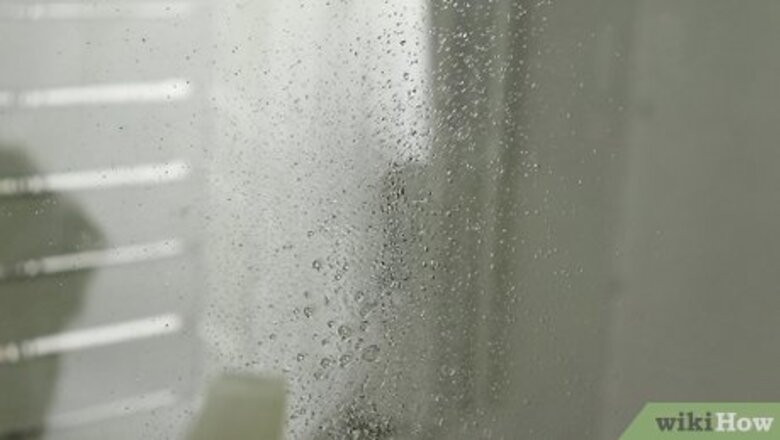
views
Using Liquid Cleaners

Use an acidic cleaner for best results. Because hard water stains are alkaline, it’s best to remove them with a powerful acid. Look for a cleaning product that contains either phosphoric, sulfuric, or hydrochloric acid, as these acids should be able to effectively break down the stains. Read the directions on the product’s label and apply the acid cleaner to the stained areas as instructed. Acidic cleaning products are toxic, so be sure to take safety precautions when handling them, such as wearing eye protection and gloves, and don’t use them on surfaces that come in contact with food, such as kitchen countertops. Acidic cleaning products work well on enamel and acrylic surfaces but can damage many others, including natural marble, stone, terrazzo, anodized or polished aluminum, and colored grout. To prevent damage, test the product in an inconspicuous area before using it on the entire stained area.
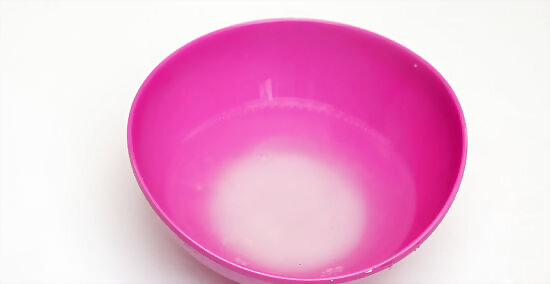
Mix salt and water. Combine salt and water and use the mixture to remove the mineral buildup. The salt acts as a scouring powder and can cut through the stain. Apply the mixture to the area and use a clean cloth to rub the stain in a circular motion. Rinse the glass thoroughly when finished to remove all saltwater residue.
Use white vinegar. Vinegar is an acid, which helps to loosen mineral deposits, and white vinegar is clear/colorless enough to not cause any staining. It’s also a natural liquid cleaner that isn’t toxic and won't potentially burn your eyes or lungs like other chemical cleaners. Mix some lemon juice into the vinegar to increase the effectiveness and add a fresh lemon scent. Lemon juice (another an acid) has the same effect on minerals as vinegar. Put your vinegar and lemon juice in a spray bottle and slightly warm them in the microwave, for 20-40 seconds depending on your microwave. A warmed cleaner can be more effective at lifting stains than cold or room temperature cleaner. Just be sure to remove the spray bottle top so that it doesn’t explode in the microwave. Spray the vinegar solution on the glass and let it stand for about 2-3 minutes before wiping it clean with a dry, lint-free cloth or a paper towel. To remove hard water stains from drinking glasses and other small glass items, fill a basin with a 50/50 solution of vinegar and water, and allow the items to soak in the solution for several hours before rinsing thoroughly.
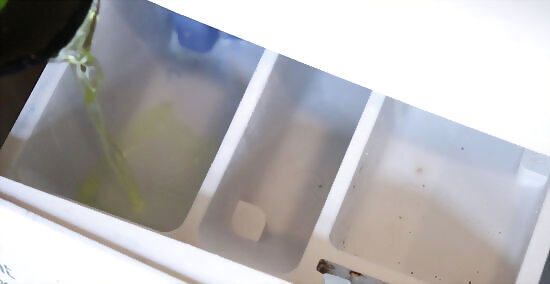
Add a rinsing agent to your dishwasher. A rinsing agent, such as Jet-Dry, will help remove hard water stains from your dishes. Fill up the designated area in your dishwasher with the rinsing agent, add your usual dishwashing detergent, and run the dishwasher for clear and clean glasses.
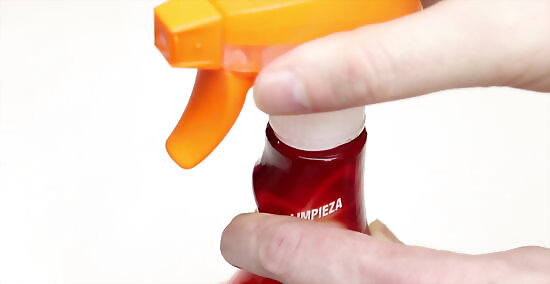
Add ammonia to basic cleaning products, but never add ammonia to chlorine bleach. It creates a toxic gas. You can try super-charging your regular all-purpose window/glass cleaner with some ammonia in order to cut through hard water stains.
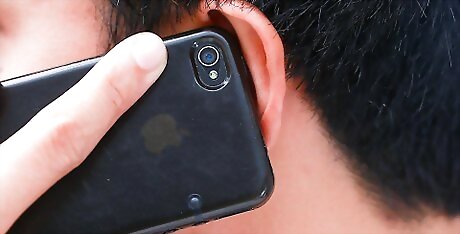
Get help from your hardware store. If these commercial products still don’t give you the desired results, you can get even tougher products from your local hardware store. Be careful though, and be sure to follow all of the manufacturer’s instructions since these will be very powerful products.
Using Non-Liquid Cleaners
Start with some “elbow grease.” Before getting into expensive or potentially toxic cleaning products, try using these scrubbing techniques first. Use “magic” and “eraser” cleaning pads or other non-scratching scrubbing sponges to safely scrub your glass surfaces. Try to remove as much as you can by scrubbing with one of these moistened sponges. It’s okay to use baking soda as an abrasive, but never use hard-bristle brushes or other abrasive cleaning tools when cleaning glass. These tools can damage the surface of the glass by scratching and/or etching it. Scrubbing works best on smaller hard water deposits, newer stains, and those that are not firmly set in.
Brush on some toothpaste. Many home cleaners use toothpaste as an alternative to baking soda. Apply some regular toothpaste to a moist towel and rub it over the stain using circular motions. Wait a few minutes and then rinse off the paste with equal parts water and vinegar to remove all residue. Restore shower doors with household cleaners. "I hated seeing those hard water stains all over my glass shower doors ever since we got a new water system. I assumed I'd need some strong chemical cleaner to stand a chance. But this article says white vinegar might do the trick! And I've got plenty of that in my cupboard. I can't wait to finally get rid of those annoying spots and have pretty, sparkling doors again!" - Guillermo E. Envision streak-free windows thanks to clever scrubbers. "I'm embarrassed to admit how long I've put off washing the outside windows around my house. They've gotten so dusty and gross over the past year. Reading about using toothpaste and magic erasers makes the job seem way more doable, though. There is no need for anything fancy — just handy stuff I already have." - Sofia A. Remove cloudy film from glassware with odd ingredients. "My mom gave me a beautiful crystal decanter set last year, but hard water stains made the glasses go all foggy and dull, looking so fast. I worried those spots were permanent since nothing seemed to shift them. But the toothpaste method sounds easy enough to attempt before I relegate them to the back of the cabinet! I'm hoping this odd trick works to revive my heirloom glasses." - Marilyn T. Confirm household products lift tough stains safely. "I scrubbed so hard trying to get those mineral stains off my shower glass that I was scared I might actually scratch or ruin the surface. This guide recommends first going the gentle route with salt, vinegar, and baking soda — no need to attack the glass if I can use common kitchen staples." - Elizabeth B. Have a story our readers should hear? Share it with 1 billion+ annual wikiHow users. Tell us your story here.

Use commercial paste cleaners. There are several commercial cleaning products for hard water stains that come in a paste formula. The main benefit of using a paste over liquid cleaner is that the paste will not leave its own liquid streaks or water marks. A downside to using paste products, though, is that they can leave behind a foggy haze if not buffed off of the glass. Be sure to follow all the label instructions to avoid this side effect.
Preventing Future Hard Water Stains
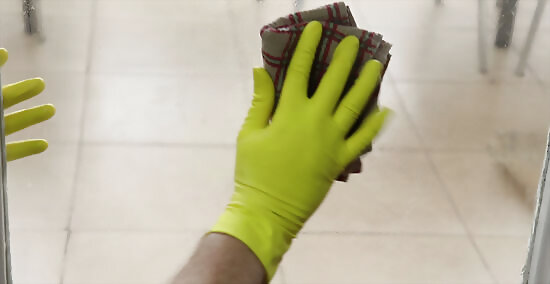
Stop stains before they start. One of the best ways to get rid of hard water stains is to intervene at the source of the problem and try to correct the pH balance and mineral levels in your water. You can try to remove the minerals in the water by attaching a filter to your water system. Water softeners can also be added to counteract hard water.
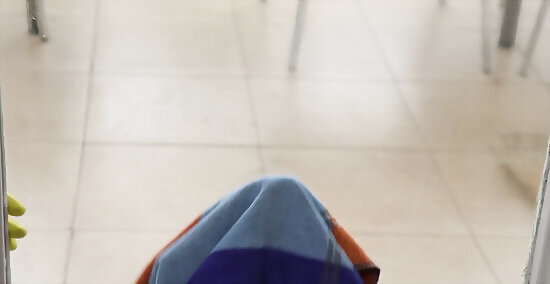
Regularly wipe down and clean glass surfaces. Hard water should be removed regularly in order to prevent it from drying into stains. Dry your shower doors after each use with a lint-free towel or with a squeegee to remove all water residue or streaks. Clean your glass every week or so to stay ahead of build-up. Act quickly: the longer a stain sits, the harder it will be to remove, and it can even become permanently etched into the glass surface.

Protect from future stains. You can also prevent hard water stains by sealing or protecting your glass surfaces. For glass tables, be sure to use coasters under drinking glasses. They’ll intercept any drips and spills and keep them from leaving ring stains on the table. For shower doors, consider applying a wax-based protective coat once or twice a year. The water will run off the wax-treated glass and leave your door clear and clean.















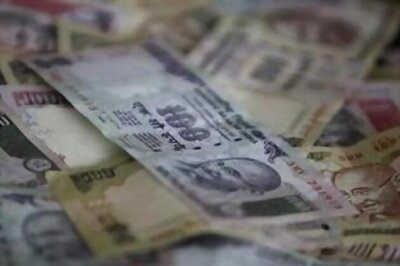

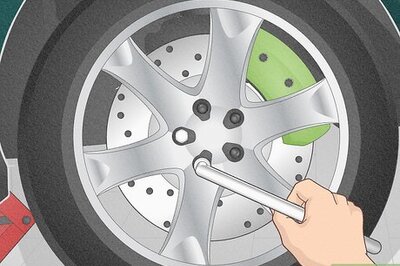
Comments
0 comment